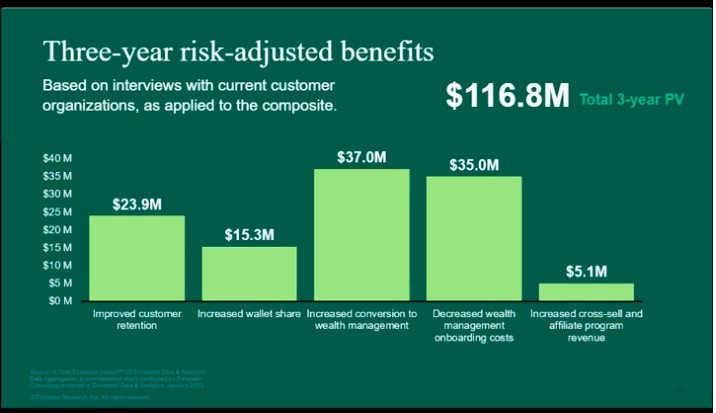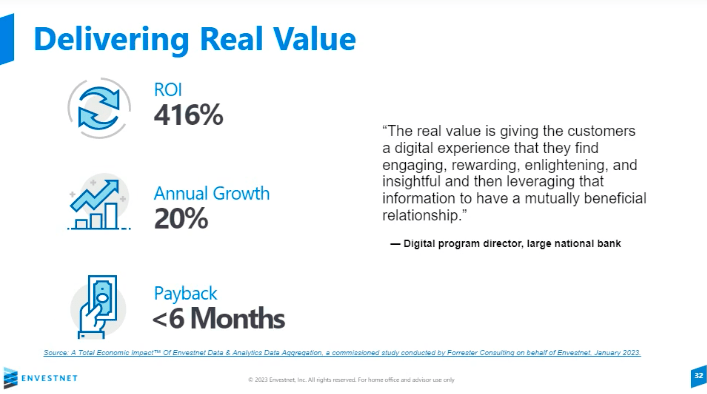At Envestnet Data & Analytics, we believe that for consumers to lead an intelligent financial life, they need all of their data in one place. So data aggregation has always been the foundation of everything we do. We’ve seen time and time again how it can enable consumers to make the best decisions and enjoy fully personalized financial experiences.
Yet when we polled the bank, wealth, and tech professionals attending our recent Business Case for Data Aggregation webinar, we found that 36% of the attendees polled didn’t use a data aggregation solution at all. Of this 36%, 22% said data aggregation was a near-term priority.
We get why organizations may be slow to adopt data aggregation. Before you invest, you want to make sure it’ll be worth it. That’s why we invited Joseph Carangelo, Consultant, Total Economic Impact from Forester Research and Chip Scully, Head of Banking at Envestnet Data & Analytics, to discuss the business case for data aggregation. You can watch the full webinar hosted by American Banker here.
When costs were factored in for Envestnet Data Aggregation, a commissioned study conducted by Forrester Consulting on behalf of Envestnet found that select financial service providers and wealth management firms that used aggregation services from Envestnet D&A achieved an ROI of 416% and an annual growth rate of 20% over three years, with their investment paid back within six months.
In the webinar, Chip mentioned how most people have multiple credit cards, 401(k)s, 529s, mortgages and other assets, all at different companies. This makes it a challenge for consumers to make an informed decision about the things they should do with their finances until all that data is pulled together. Which is why data aggregation can be critical.
But wait, you say. “Show me the money”, as Chip quoted from the movie Jerry Maguire.
This is our “Show me the money” moment. Forrester has gathered that it may be in your company’s best interest to use data aggregation to pull all these disparate, disconnected data sources together. Guest speaker Joseph Carangelo walked through Forrester’s study in our webinar and explained how Forrester applied their Total Economic Impact™ methodology to Envestnet Data Aggregation to assess the potential benefits, costs, and risks of the investment.
He showed how Forrester’s study unveiled five quantifiable benefits to the studied entities after using Envestnet Data Aggregation that were risk-adjusted after three years:
$23.9M improved customer retention: Aggregated data helps organizations understand the financial journey their customers are on and better predict and meet upcoming their needs to increase retention.
$15.3M increased wallet share: Data aggregation helps to enable organizations to view held-away assets and craft solutions to bring those assets in-house.
$37M increased conversion to wealth management: With comprehensive segmentation, firms can better serve their customers and know when a customer would be an ideal candidate for conversion to a wealth management account structure.
$35M decreased wealth management onboarding costs: Automated onboarding and account linking decreases the amount of time it takes to gather a client’s financial information by an estimate of eight hours, significantly decreasing onboarding costs.
$5.1M increased cross-sell and affiliate program revenue: With a more complete picture of a customer’s financial situation, organizations can uncover gaps and opportunities to cross-sell timely solutions and introduce other programs.

Forrester found that Envestnet Data Aggregation helped to relieve technology integration and organizational burdens too, with the following qualitative benefits:
- Technology interface flexibility
- High levels of quality and security
- Highly communicative and collaborate product planning
- A pricing and contracting philosophy that enables scale and growth

You can share these study results with your decision-makers and teams to make a solid case for data aggregation.
Another interesting takeaway from the webinar was that 50% of attendees who answered our poll said that using data aggregation to enable guidance through improved personalization was a key value for their organization.
Personalization is important to consumers and our industry as a whole. And data aggregation is at the core of today’s personalized digital experiences.
As one of our clients – a digital program director at a large national bank – stated in a Forrester interview, “The real value is giving the customers a digital experience that they find engaging, rewarding, enlightening, and insightful and then leveraging that information to have a mutually beneficial relationship.”
Chip confirmed the importance of personalization. “I think as more financial institutions adopt more of the spirit of trying to offer their end users hyper personalization and more experiences to help them, especially now when we're in a difficult economic environment, then I think that more users are going to see their retail banks as a place that isn't just a steward of their money, but a place that they can come to expect hyper-personalization and enablement and empowerment to make financial decisions easier,” he said.
So now that we have evidence of the value of data aggregation, it’s our belief that it makes it simpler and more credible to build a case for data aggregation to senior leadership.
Watch the full Business Case for Data Aggregation webinar here.
For a copy of Forrester’s study, visit solutions.yodlee.com/forrester-roi-study.




